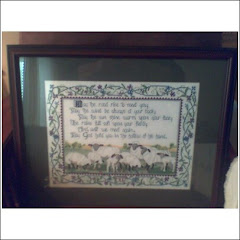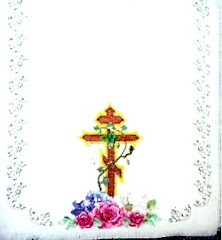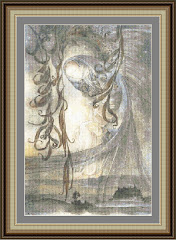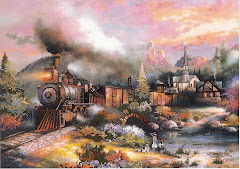Still trying to figure out how to get my "picture" (I give you fair warning, it's a sheep!) on my settings page. The directions given by Blogspot aren't working. Phooey.
Anyway, it occurs to me that my blog would be a good place to post about various people in my life who have passed on, and why they seem memorable to me. Today is the anniversary of my Great-Great-Uncle Jack's death in the "Great War" (1914-1918), a.k.a. World War I.
Folks in Kentucky who are familiar with the Veterans Hospital in, I think, Lexington, may have heard of a great psychiatrist named Spafford Ackerly. Dr. Ackerly did a lot of research into what was called "shell shock," now "post-traumatic stress disorder," that was particularly prevalent in veterans whose combat experience left them mentally ill. I'm told he was known and loved for his great compassion for these veterans.
What isn't so well known is that Dr. Ackerly almost wasn't Dr. Ackerly -- he almost died in World War I. That he didn't -- well, that's Uncle Jack's contribution.
My mother's mother died when she was six, in 1932, as the result of complications of childbirth. The six children she left behind were raised by their grandmother, who had lost six children of her own in childbirth -- only two survived to adulthood, my grandmother (the one who died in 1932), and Uncle Jack. To us, growing up, my mother's Uncle Jack loomed larger than life, so even though we never knew him, every year around this time, my mother would take out Dr. Ackerly's letter to her grandmother and read it aloud to us kids; it made those boring history books of ours seem so much more real, hearing about the strange connection between a college graduate and a Brooklyn streetcar conductor.
In those days, when you went to war, you went with guys from your own neighborhood. Uncle Jack's regiment, therefore, was made up exclusively of young men from Brooklyn, mostly Irish Catholics. In those days, officers were drawn exclusively from West Point, so whether or not you had a college degree, if you weren't a career officer, you were enlisted. That's how Spafford Ackerly came to be serving alongside this streetcar conductor in the trenches of France.
Somehow, these two men got cut off from their unit -- I have a copy of Dr. Ackerly's letter somewhere, in which he details how that occurred -- and were hunkered down in a trench, taking a lot of enemy flak. Dr. Ackerly had gotten wounded, and stood no chance of wriggling back to safety; he was virtually a goner. According to that letter, Uncle Jack said to him, "'Ack, I can't take ya back, but I'll stick with ya till the end.' The end soon came, for as that big Irishman peered over the trench to scout for help, he took a bullet to the head. I sat cradling his head in my lap, calling his name over and over, when suddenly a leering Hun loomed over us in that trench. I fully expected to join Jack in the Promised Land, but for reasons I'll never know, that Hun just turned and walked away." At nightfall, members of that Brooklyn regiment found Dr. Ackerly and the body of my uncle, and carried them to safety. Dr. Ackerly wrote his letter to his parents, copy to my great-grandmother, from a hospital bed in France.
I guess his combat experience, and all he had witnessed, were the inspiration for his becoming a doctor and then a psychiatrist. But interestingly, he never forgot my uncle's family; every year, he sent my great-grandmother a Christmas card, and I believe corresponded regularly with her, and after her death in 1952, he continued to write to the oldest girl in the family, my Aunt Mary. That was a generation that didn't forget its debts.
Wars come, and wars go. We grew up believing in "just" wars; as an Orthodox Christian, I now understand that there is no such thing. War is always evil, but when it is fought to repress a greater evil and to defend those who can't defend themselves, it's a necessary evil. I can't imagine how my great-grandmother felt, losing her only son on a foreign battlefield, and I can't imagine how she felt losing her only surviving child, fourteen years later. But at least she knew her son's death wasn't for nothing. A great man made sure she always knew that.
Tuesday, September 27, 2005
Subscribe to:
Post Comments (Atom)





1 comment:
What a neat way to use your blog, Baba Meg and I enjoyed getting to know your Uncle Jack. May his Memory be Eternal.
Post a Comment